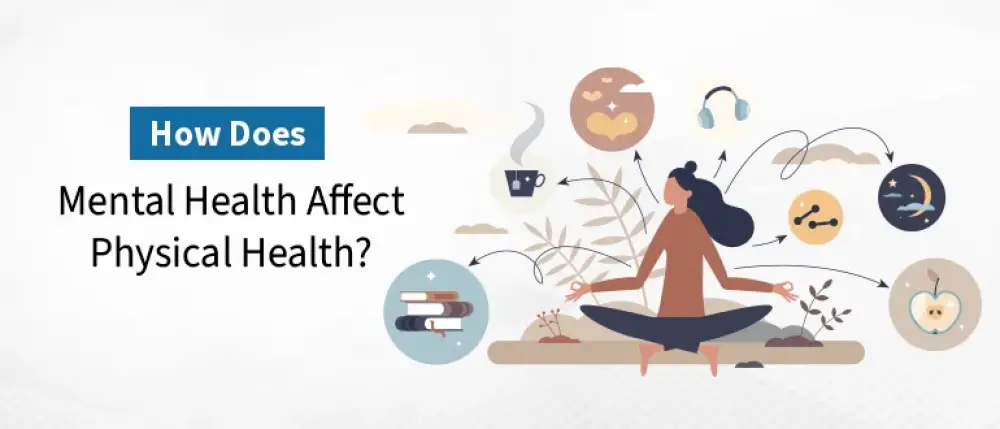Subscribe to get weekly insights
Always stay up to date with our newest articles sent direct to your inbox
Published on 9 Aug, 2023
Updated on 7 Feb, 2025
5187 Views
4 min Read

Written by Care Health Insurance
favorite1Like
“The mind and body are not separate. What affects one affects the other.”
A lot has been happening across the globe day and night, and many people's mental health has gone for a toss seeing unfortunate events around them. However, being anxious or worried once in a while doesn't mean you have developed a mental illness. A mental illness is a condition related to mental health that interferes with how you think or perform day-to-day tasks. The conditions identified as mental health issues include bipolar disorder, OCD (obsessive-compulsive disorder), PTSD (post-traumatic stress disorder), schizophrenia, depression, generalised anxiety disorder, and so on.
Mental illness affects everyone regardless of gender, race, qualification and ethnic background and income level. And little do you know that mental illnesses are absolutely curable if one seeks help from a professional in time. This article will address the most often ignored health condition, mental illness. Read on to learn about the factors affecting mental health and much more.
Your mental health comprises social, psychological and emotional well-being. It gets affected when you start to feel, think and act more than is required at any stage of life. Mental health is about handling anxiety and stress and making favourable choices that don't weaken your mental health.
According to a report by the World Health Organization (WHO), India has the most significant number of people with mental issues. The burden of people with mental illnesses has increased by 25% in India during the pandemic.
Poor mental health has become the second largest health burden globally. People with poor mental health should also know their overall physical health is affected. Below are the reasons why mental health is essential for overall health-
Many different conditions related to mental health are categorised as mental illnesses. The most prevalent ones include-
Signs and symptoms of mental problems vary according to the severity of the illness. Below are some common symptoms one may experience-
One may also experience physical problems such as back pain and stomach ache due to poor mental health.
There is no known reason or cause for mental illness. Various factors lead to the risk of mental illness. They include-
People with mental illness often ease their signs and symptoms by consulting a therapist and following the guidance and treatment plan that could also include medication. Your mental health councillor may follow the following diagnosis if the condition is extreme-
The surge in mental health illnesses, including psychological disorders, has become enormous over the years. Your health insurance is a shield that keeps you protected against any medical emergency and the treatment cost it brings along. Care Health Insurance’s health insurance policy will help you through a cashless facility towards Consultation, Counseling and rehabilitation of the policyholder for the following mental illnesses-
So, if you wish to minimise the burden of arranging finances caused by mental illnesses for yourself or someone in the family, you can consider securing yourself with a plan that also covers mental illnesses.
>> Also Read: Do Health Insurance Plans Cover Mental Illnesses?
Disclaimer: The above information is for reference purposes only: Policy Assurance and Claims at the underwriter's discretion.
Thyroid : मामूली नहीं हैं महिलाओं में थायराइड होना, जानें इसके लक्षण और घरेलू उपचार Vipul Tiwary in Diseases
शुगर कंट्रोल कैसे करे? जानें, डायबिटीज में क्या खाना चाहिए Vipul Tiwary in Health & Wellness
हाई ब्लड प्रेशर को तुरंत कंट्रोल कैसे करें? देखें इसके उपाय Vipul Tiwary in Diseases
पैरों में दर्द किस कमी से होता है? जानें, इसके घरेलू इलाज Vipul Tiwary in Health Insurance Articles
Neglecting Oral Health and Hygiene? Your Brain Could Suffer the Consequences Jagriti Chakraborty in Mental Health
Unlock Your Health: Protein Powder for Women and Key Supplements Jagriti Chakraborty in Diet & Nutrition
Forget Yoghurt: 8 Probiotic Foods That Actually Work Jagriti Chakraborty in Health & Wellness
BIG Update: Nipah Virus Is Back, Here’s How to Stay Safe! Sejal Singhania in Health Insurance Articles
Always stay up to date with our newest articles sent direct to your inbox
Loading...